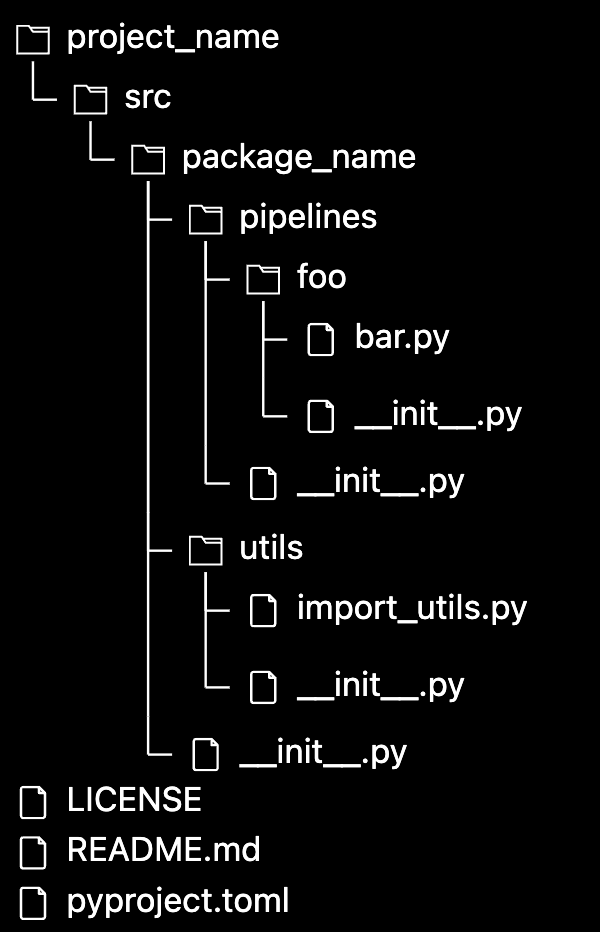参考资料:
https://cloud.tencent.com/developer/article/2204701
https://github.com/huggingface/diffusers
想研究这个lazy import的起因是:我想学习一下高级的算法工程师是如何构建一个pip包的,然后我发现在diffusers这个广泛使用的huggingface包的组织方式中出现了_LazyModule这个破东西。
查阅资料后知道,_LazyModule这个模块实际上对应了python中的一种lazy import的思想。也就是在整个包很大的情况下不再将所有的包都import,而仅仅在使用的时候进行真正的import。这么做可以极大地缩短整个的import时间。
OK,教练我想学这个,我也想让我的包摩登一把?我要怎么做?首先介绍几个点:
1. lazy import这个特性虽然python中已经有PEP做阐述,但是并没有官方的built-in包做支持
2. 如果我们想在自己的包中使用lazy import,完全可以借鉴别人已经实现好的类(diffusers,就决定是你了)
接下来我讲一下如何使用diffuers里面的lazy import代码让我我们的项目实现lazy import,项目组织如下:

重点在于两个地方:一个就是utils文件夹,这个文件夹里的import_utils.py包含了我们lazy import类的实现。另一个就是若干__init__.py文件,这些文件就讲我们lazy import的逻辑交代地很清楚。我们首先来看一看lazy import类的实现:
1 # Inspired by diffusers repo
2 # https://github.com/huggingface/diffusers/blob/main/src/diffusers/utils/import_utils.py
3 import os
4 import importlib.util
5 from itertools import chain
6 from types import ModuleType
7 from typing import Any
8
9
10 class _LazyModule(ModuleType):
11 """
12 Module class that surfaces all objects but only performs associated imports when the objects are requested.
13 """
14
15 # Very heavily inspired by optuna.integration._IntegrationModule
16 # https://github.com/optuna/optuna/blob/master/optuna/integration/__init__.py
17 def __init__(self, name, module_file, import_structure, module_spec=None, extra_objects=None):
18 super().__init__(name)
19 self._modules = set(import_structure.keys())
20 self._class_to_module = {}
21 for key, values in import_structure.items():
22 for value in values:
23 self._class_to_module[value] = key
24 # Needed for autocompletion in an IDE
25 self.__all__ = list(import_structure.keys()) + \
26 list(chain(*import_structure.values()))
27 self.__file__ = module_file
28 self.__spec__ = module_spec
29 self.__path__ = [os.path.dirname(module_file)]
30 self._objects = {} if extra_objects is None else extra_objects
31 self._name = name
32 self._import_structure = import_structure
33
34 # Needed for autocompletion in an IDE
35 def __dir__(self):
36 result = super().__dir__()
37 # The elements of self.__all__ that are submodules may or may not be in the dir already, depending on whether
38 # they have been accessed or not. So we only add the elements of self.__all__ that are not already in the dir.
39 for attr in self.__all__:
40 if attr not in result:
41 result.append(attr)
42 return result
43
44 def __getattr__(self, name: str) -> Any:
45 if name in self._objects:
46 return self._objects[name]
47 if name in self._modules:
48 value = self._get_module(name)
49 elif name in self._class_to_module.keys():
50 module = self._get_module(self._class_to_module[name])
51 value = getattr(module, name)
52 else:
53 raise AttributeError(
54 f"module {self.__name__} has no attribute {name}")
55
56 setattr(self, name, value)
57 return value
58
59 def _get_module(self, module_name: str):
60 try:
61 return importlib.import_module("." + module_name, self.__name__)
62 except Exception as e:
63 raise RuntimeError(
64 f"Failed to import {self.__name__}.{module_name} because of the following error (look up to see its"
65 f" traceback):\n{e}"
66 ) from e
67
68 def __reduce__(self):
69 return (self.__class__, (self._name, self.__file__, self._import_structure))
这里不打算细讲,源码在https://github.com/huggingface/diffusers/blob/main/src/diffusers/utils/import_utils.py,我做了一些精简,读者可以直接copy,接下来讲用法:
我们首先看一下最高层的包是如何调用这个lazy import类的,也就是package_name下的__init__.py:
# Only support lazy import for now.
# TODO: support slow import
import sys
__version__ = "0.1"
from .utils import (
_LazyModule
)
_import_structure = {
"pipelines": []
}
_import_structure["pipelines"].extend(
[
"a",
"LayoutDMPipeline"
]
)
sys.modules[__name__] = _LazyModule(
__name__,
globals()["__file__"],
_import_structure,
module_spec=__spec__,
extra_objects={"__version__": __version__},
)
我们首先用了一个字典将我们想要导入的东西包起来,然后一起喂给_LazyModule,最后由_LazyModule传给sys.modules
这个包起来的东西包含了根目录的下级目录,extend的部分是我们最终想要导入的东西。流程是这样:
我们想要一个名为a的东西,那么packge就会去找下级目录找a,如果下级目录能够找到a,那么显然可以直接 from XX import a。但是问题出在下级目录显然也没有a,下级目录又要到下下级目录中去找,直至找到。我们不妨看看叶子的__init__.py
# Only support lazy import for now.
# TODO: support slow import
import sys
from ...utils import (
_LazyModule
)
_import_structure = {}
_import_structure["bar"] = ["a"]
sys.modules[__name__] = _LazyModule(
__name__,
globals()["__file__"],
_import_structure,
module_spec=__spec__,
)
就是这样~
最后再顺一遍:我们通过from XX import a,python有如下操作
从XX中要a,XX再找pipelines要a,pipelines再找foo要a,foo再找bar要a,最终要到了a。
这么一来,from XX import a, from XX.pipelines import a, from XX.pipelines.foo import a, from XX.pipelines.foo.bar import a,全部都是可用的。







 已为社区贡献8条内容
已为社区贡献8条内容

所有评论(0)